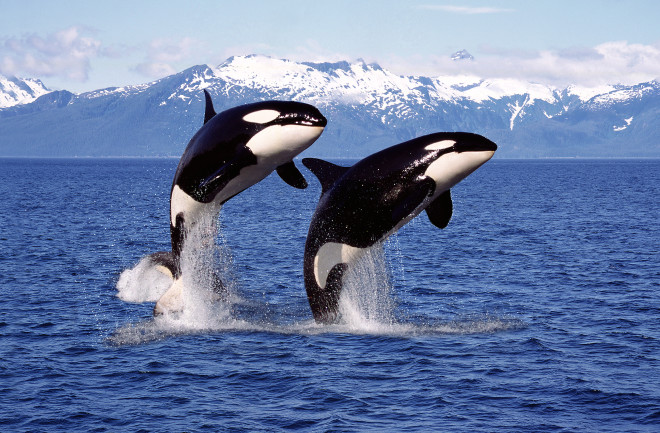Having a son can be a costly experience for orca mothers, also known as killer whales — and it comes at the expense of having additional offspring, researchers have found.
In a recent study, researchers report that male offspring from a population known as the southern residents — which are found off the Pacific coast of the U.S. — depend upon their mothers to such an extent that they reproduce less. (Daughters, however, don't appear to impact reproduction.) These adult sons impose “biologically significant reproductive costs” on their mothers, according to the study. Researchers drew upon data of forty females from the population, dating back to the 1980s, to reach their conclusions.
Read More: A New Whale Species Is Fighting for Survival
How Long Do Orcas Stay with Their Mothers?
“We've known for quite some time now that mother killer whales off the Pacific Northwest help keep their offspring alive throughout their lives,” says animal behaviorist Michael Weiss, research director at the Center for Whale Research and one of the paper's authors.
Female Orca Whales and Sons
Previous studies showed that the mortality rates of male killer whales increase when their mothers die. It’s also known that within this population — which is highly dependent on Chinook salmon — female orca whales share their bounty with their sons, splitting the fish in half.
One hypothesis is that due to this salmon-sharing practice, the mothers may not be able to carry a pregnancy through to term, says Weiss. In the end, orca moms pay a high price no matter what.
Orca Offspring
Thus far, this mother-son dependency of orca offspring is only known to occur in the southern resident population. “We're interested to look if it's present in these other populations with strong mother offspring relationships,” Weiss says.
For Julia Sutherland, a researcher with the Sea Mammal Research Unit at the University of St. Andrews who was not involved in the recent study, such comparisons are “intriguing,” highlighting how different killer whale populations can function.
Read More: Humpback Whales Are Increasingly Giving Up on Singing
“For mammal feeders foraging inshore in Scotland, for example, we have field observations of males actively hunting and even provisioning younger members of the group," she says. "We see consistent pairs and individual roving males who successfully hunt independently. The findings from this paper offer an interesting case to compare and contrast with population dynamics elsewhere in the world.” This also includes learning how long the other baby killer whales stay with their mothers.
What these findings mean for the population’s longevity and wider conservation is still unclear, says Weiss, and further research is needed. Last year, only 73 southern resident orcas remained in this population.
Orca Conservation Status
“We know from previous modeling that the growth of this population going forward is going to be mostly determined by the population’s reproductive rate,” Weiss adds. Whether female killer whales have sons will be an important factor to consider going forward in such modeling, based on these findings.
“We're interested in how this might play into extinction risk but what's driving the population to extinction is a lack of their primary food source,” Weiss says. Food shortages, boats, and pollution are all known to be impacting the population, resulting in their endangered status. “They are Chinook salmon specialists, which are in decline or greatly reduced from historical levels.”
“But at the end of the day, from a conservationist perspective, the thing that we need to do is pretty clear," says Weiss. "It's not easy, but [we need to] recover their prey populations."
Read More: If Managed Properly, Whale and Dolphin Carcasses Can Benefit Coastal Ecosystems
